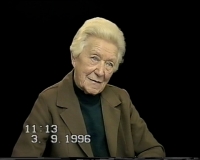Why do flowers grow, who makes them grow except God?

Download image
Gerta Münzer-Bennett was born in 1913 in Pilsen. She spent her childhood in Karlovy Vary, where her father owned a textile factory. After graduating from grammar school, she began to study at the faculty of medicine in Prague, where her family moved. In Prague, she married a man who had to flee Germany after the Nazis took power. She then helped his parents and brothers to emigrate to Czechoslovakia. She was persecuted because of her Jewish origin, her family lost their property and her mother hanged herself. Together with her husband and his parents, she was taken to the Łódź ghetto, where she worked as a typist in the office of Aron Jakubowicz, a member of the Jewish Council in charge of organising forced labour. After the death of her father-in-law, she was transported with her husband and mother-in-law via Auschwitz to the Stutthof concentration camp as part of the liquidation of the ghetto. She was the only member of her family to survive the appalling conditions in the camp and its evacuation, and was deployed to forced labour in Dresden, where she also experienced Allied bombing. After returning to Prague, she assumed a false identity and collaborated with the resistance. In the second half of the 1940s she emigrated to Australia, remarried and gave birth to a son. RECORDING SOURCE: https://www.ushmm.org/collections/the-museums-collections/about https://collections.ushmm.org/search/catalog/irn505880
